七年级英语辅导材料6
人教版初中英语七年级上册Unit6词句精讲

天锐教育学科老师辅导讲义学员姓名:年级:辅导科目:英语学科教师:授课日期2019年月日授课时段授课主题七年级上册Unit6教学内容Unit 6 Do you like bananas?词句精讲精练一、词汇精讲1. eat&haveeat 与have 都可以表示“吃”的意思,有时两者可互换。
例如:I eat (have) an apple every day. 我每天吃一个苹果。
They are having (eating) their lunch. 他们在吃中饭。
eat 可用作不及物动词,后面不跟宾语。
但是have没有这个用法。
例如:We eat well at noon. 我们午饭吃的很好。
注意:“吃药”习惯说“have(take) medicine”,不说“eat medicine”。
2. well&good两者都可以表示“好”的意思。
well是副词,用于修饰动词。
例如:Tom speaks Chinese well. 汤姆的汉语说得好。
He sings well. 他唱得好。
good是形容词,用作定语或表语。
例如:She is a good doctor. 她是个好医生。
His pronunciation is very good. 他的发音很好。
well作形容词时,指的是健康状况良好。
例如:He is quite well. 他身体好。
I hope you will be well soon. 我希望你很快好起来。
3. no&notno 表示“不”,修饰可数名词单数时no=not a; 修饰可数名词复数或者不可数名词时no=not any。
例如:I have no book.=I don’t have a book.I have no books. = I don’t have any books.There is no water in the cup.=There isn’t any water in the cup.no 常用来做否定回答,与yes相对应,not不可以。
新目标七上册unit6教辅资料

“三语”模式下藏区中学七年级英语单元教辅资料Unit6 Do you like bananas ?基础知识点1. 词汇、短语及句型2.语法讲解(1) 一般现在时。
一般现在时表示经常性、习惯性的动作,或表示现在的特征、状态。
当主语是非第三人称单数时,行为动词的一般现在时的变化形式见下表。
(2)可数名词与不可数名词①可数名词:即可以计数的名词,有单数、复数形式。
②不可数名词:即指不可能计数的名词。
不可数名词没有复数形式,不能与不定冠词连用来表示量。
句式解析1.Do you like yogurt? 你喜欢酸奶吗?like v. 作“喜欢”讲时,主要有以下句型:①like sth. / sb. 喜欢……②like doing sth. 喜欢做……③like to do sth. 想做……【注意】dislike v. 意为“不喜欢”;unlike prep. 意为“不像”【例题】I like _________. But I don’t like _________today.A. swimming, swimmingB. to swim, to swimC. swimming, to swimD. to swim, swiming【解析】like doing sth. 意为“喜欢做……”,表示经常性的喜好和习惯;like to do sth. 意为“想做……”,表示具体的某一次活动=want to do。
根据题意正确答案为C。
【拓展】dislike, love, hate 都有类似的用法。
2.How much yogurt do we need? 我们需要多少酸奶?How much①主语用于对不可数名词的数量的提问。
How much tea do you want?②还可用于询问价钱。
-- How much is this pen? -- It’s 3 dollors.-- How much are these apples? -- They’re 10 dollors.How many 主语用于对可数名词的数量的提问。
(仁爱版)七年级英语总复习Unit-6-Topic-3知识点、练习和参考答案
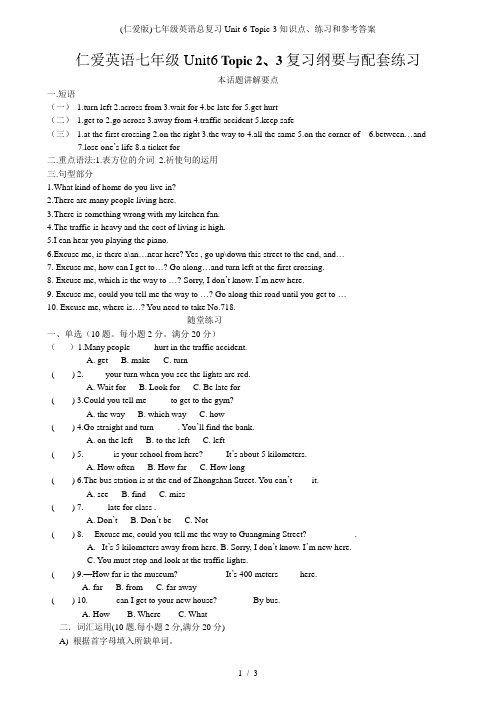
仁爱英语七年级Unit6 Topic 2、3复习纲要与配套练习本话题讲解要点一.短语(一)1.turn left 2.across from 3.wait for 4.be late for 5.get hurt(二)1.get to 2.go across 3.away from 4.traffic accident 5.keep safe(三)1.at the first crossing 2.on the right 3.the way to 4.all the same 5.on the corner of 6.between…and7.lose one’s life 8.a ticket for二.重点语法:1.表方位的介词 2.祈使句的运用三.句型部分1.What kind of home do you live in?2.There are many people living here.3.There is something wrong with my kitchen fan.4.The traffic is heavy and the cost of living is high.5.I can hear you playing the piano.6.Excuse me, is there a\an…near here? Yes , go up\down this street to the end, and…7. Excuse me, how can I get to…? Go along…and turn left at the first crossing.8. Excuse me, which is the way to …? Sorry, I don’t know. I’m new here.9. Excuse me, could you tell me the way to …? Go along this road until you get to …10. Excuse me, where is…? You need to take No.718.随堂练习一、单选(10题。
Unit 6-七年级英语上册语法精讲+课内知识拓展+课后精准练习(人教版)
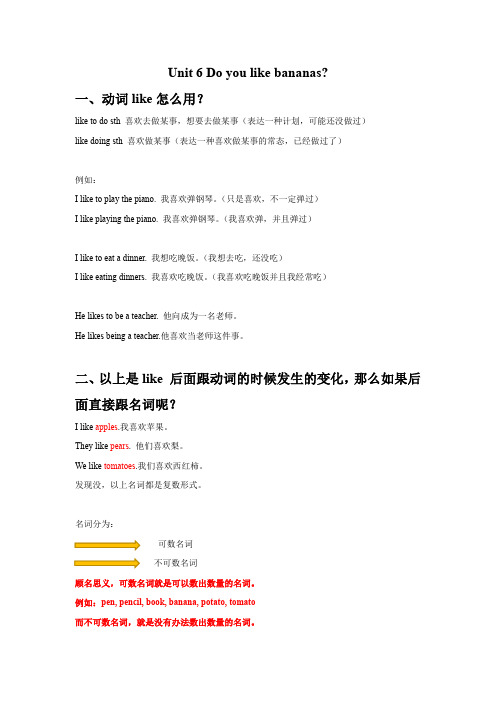
Unit 6 Do you like bananas?一、动词like怎么用?like to do sth 喜欢去做某事,想要去做某事(表达一种计划,可能还没做过)like doing sth 喜欢做某事(表达一种喜欢做某事的常态,已经做过了)例如:I like to play the piano. 我喜欢弹钢琴。
(只是喜欢,不一定弹过)I like playing the piano. 我喜欢弹钢琴。
(我喜欢弹,并且弹过)I like to eat a dinner. 我想吃晚饭。
(我想去吃,还没吃)I like eating dinners. 我喜欢吃晚饭。
(我喜欢吃晚饭并且我经常吃)He likes to be a teacher. 他向成为一名老师。
He likes being a teacher.他喜欢当老师这件事。
二、以上是like 后面跟动词的时候发生的变化,那么如果后面直接跟名词呢?I like apples.我喜欢苹果。
They like pears. 他们喜欢梨。
We like tomatoes.我们喜欢西红柿。
发现没,以上名词都是复数形式。
名词分为:可数名词不可数名词顾名思义,可数名词就是可以数出数量的名词。
例如:pen, pencil, book, banana, potato, tomato而不可数名词,就是没有办法数出数量的名词。
例如:water, milk, bread, juice, money有同学会有疑问,一杯水不是数量吗?一杯水数的是杯子,一块面包数的是块数,一瓶牛奶数的是瓶子,所以可以在不可数名词前面加量词来表示数量。
专项训练:判断以下名词是可数名词还是不可数名词答案:三、可数名词单复数形式变化规则专项训练:请写出以下可数名词的复数形式:答案:适当形式填空1.We have three_____(sheep).2.I have a some_____(money).3.They have two_____(teacher).4.There are many_____(people)live in the city.5.She like collecting(收集)______(leaf).答案解析:1.sheep,单复数同形2.money,不可数名词没有复数形式3.teachers4.people,单复数同形5.leaves四、以f/fe结尾的可数名词变复数的两种变法1.改f/fe 为v再加es小偷之妻生活难(小偷thief,妻子wife,生活life)自己扫叶来做饭(自己self,叶子leaf)忽见一狼躲架后(狼wolf,架子shelf)取刀把它劈两半(刀knife,半half)2.直接加s海湾悬崖有一屋(海湾gulf,悬崖cliff)屋顶首领有信仰(屋顶roof,首领chief,信仰belief)质问农奴偷家财(农奴serf)证据写在手帕上(证据proof,手帕handkerchief)专项训练:请写出以下单词的英语及复数形式答案:五、不可数名词的量词有哪些?专项训练:默写上面的短语六、关于蔬菜的单词拓展专项训练:默写上面的单词翻译下列句子:1.我喜欢吃茄子。
七年级上英语Unit 6-经典教学教辅文档

I don't like oranges. Do you like oranges? Yes, I do.
No, I don’t.
5
6
Ask and answer What are these? Do you like oranged answer
Do you like …?
It’s bread.(不可数名词) ice-cream. salad. milk.
2
What are these ?
They’re bananas. hamburgers pears
strawberries oranges tomatoes
3
4
I have two pears. I like pears. I have three apples. I like apples. I have four bananas. I like bananas.
Do you like …? Yes, I do. / No, I don’t.
Yes, I do. / No, I don't.
190
Report and Act
Do you like hamburgers?
Yes, I do.
No, I don’t. I don’t. like bananas.
Do you like bananas ?
yes,I do.
11
Homework
1.用“I like ....,I don’t like ..... Do you like …? Yes, I do. / No, I don‘t.” 写一篇小作文,培养学生的思维能力,提 高写作水平。
2.回家调查父母喜欢和不喜欢的食物, 并试着为他们做一顿可口的饭菜。提高学 生对所学知识的实际运用能力,让学生学 会感恩父母。
七年级英语上册 Unit 6 Do you have bananas拓展资料素材 人教新目标版(2
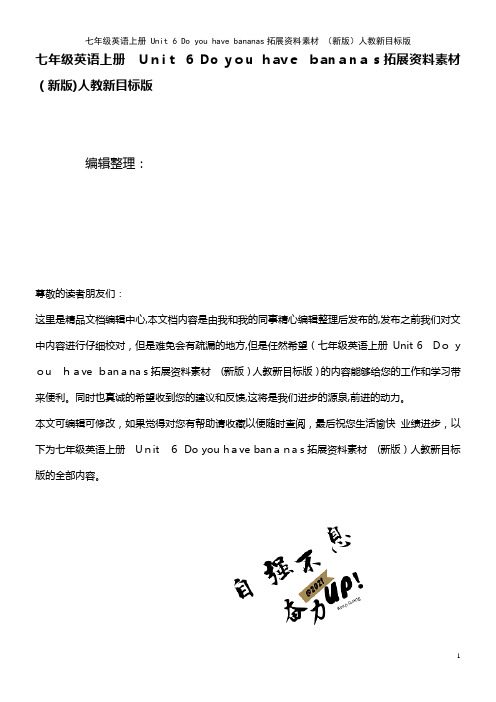
七年级英语上册Unit6 Do you havebananas拓展资料素材(新版)人教新目标版编辑整理:尊敬的读者朋友们:这里是精品文档编辑中心,本文档内容是由我和我的同事精心编辑整理后发布的,发布之前我们对文中内容进行仔细校对,但是难免会有疏漏的地方,但是任然希望(七年级英语上册Unit 6 Doy ou have bananas拓展资料素材(新版)人教新目标版)的内容能够给您的工作和学习带来便利。
同时也真诚的希望收到您的建议和反馈,这将是我们进步的源泉,前进的动力。
本文可编辑可修改,如果觉得对您有帮助请收藏以便随时查阅,最后祝您生活愉快业绩进步,以下为七年级英语上册Unit 6Do you have bananas拓展资料素材(新版)人教新目标版的全部内容。
Unit 6 Doyou have bananas1.西方人的饮食习俗在西方人的一日三餐中几乎每餐都有面包.主食面包多为咸面包。
法国人喜欢棍式的硬皮咸面包(即法式面包),它完全不含糖。
早餐面包通常是涂有果酱和奶油的烤面包.正餐中的面包常随汤一起吃.西方人的午餐大多十分简单。
加有蔬菜、鸡蛋、奶酪或红肠的面包(即三明治)成了不少人午餐的主食.在西方国家。
甜点几乎成了人们每日饮食中不可缺少的部分。
甜点在正餐中相当于最后一道菜。
在餐馆进餐时,汤(或沙拉)和主菜之后,照例有若干甜点(夏季还包括冰淇淋)供顾客选择.甜点之后紧接着是咖啡或茶.喝午茶是西方人,尤其是英国人传统的生活习惯。
传统的午茶时间大约在下午4点。
与午茶相伴的有各种花式糕点。
2.Hotdog的来历“热狗"这个名称十分古怪,它是由英语hotdog直译而来.然而非常滑稽,hot dog一词却来源于一张漫画上的讹写。
1906年,细长流线型的香肠,在美国仍是一种新奇的食物,有各种各样的叫法,“德希臣狗香肠”便是其中的一种叫法。
德希臣狗是指长体短腿棕毛狗,由于香肠的形状颇似这个品种的狗而得名。
人教版初中英语中考总复习七年上册Unit 6基础知识讲解精品课件

For breakfast, I like eggs, oranges and bananas, but I don’t like milk.我早餐喜欢吃鸡蛋,橘子和香蕉,但我不 喜欢牛奶。 该结构“for 加三餐名词,主语 加like的适当形式 再加食 品”是固定句型,表示“某人某餐喜欢吃……“,for短语也 可以放到句尾,此时for前面不加逗号。因此上面的句子 可以改为:I like eggs, oranges and bananas for breakfast
用括号中所给词的正确形式填空 1. There are some _to_m__a_t_o_es_(tomato) in the basket. 2. Do you like French _f_r_i_es__(fry)? 3. She _h_a_s_(have) ice cream for dessert. 4. _H__e_a_lt_h_y_(health) food is important. 5. She _d_o_e_s_n_’_t (do not) like playing sports. 6. _D__o_es_ your mother _w_a_t_c_h_(watch) TV every day? 7. The little girl likes _s_t_ra_w__b_e_r_r_ie_s_(strawberry) a lot. 8. Lots of children like _p_l_a_y_in_g__(play) football. 9. Chicken __is__(be) very delicious. 10. My daughter _g_o_e_s_(go) to school on weekdays.
—I have no books and no pens. no常用来做否定回答,与yes相对应,not不可以。 例如:—Do you like apples? —No, I don’t. not用于否定句,放在be动词、助动词或情态动词后面表示 否定,no不可以。 例如:可以说I don’t like milk. 但不能说I do no like milk.
Unit6讲义人教版英语七年级上册
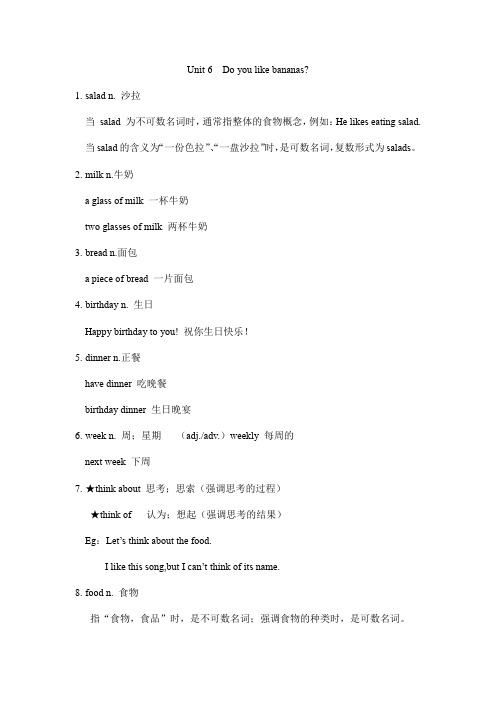
Unit 6 Do you like bananas?1.salad n. 沙拉当salad 为不可数名词时,通常指整体的食物概念,例如:He likes eating salad.“一盘沙拉”时,是可数名词,复数形式为salads。
当salad的含义为“一份色拉”、k n.牛奶a glass of milk 一杯牛奶two glasses of milk 两杯牛奶3.bread n.面包a piece of bread 一片面包4.birthday n. 生日Happy birthday to you! 祝你生日快乐!5.dinner n.正餐have dinner 吃晚餐birthday dinner 生日晚宴6.week n. 周;星期(adj./adv.)weekly 每周的next week 下周7.★think about 思考;思索(强调思考的过程)★think of 认为;想起(强调思考的结果)Eg:Let’s think about the food.I like this song,but I can’t think of its name.8.food n. 食物指“食物,食品”时,是不可数名词;强调食物的种类时,是可数名词。
9.right adj. 正确的;—(反义词)wrong 错误的adj. 右边的;—(反义词)left 左边的★All right!用作对方建议或劝告的应答语。
Eg:—Let’s go and ask him.让我们去问他。
—All right. 好的。
10.star n. 星星;明星a volleyball star 一个排球明星11.eat v. 吃★eating habits 饮食习惯12.well adv. 好;令人满意地(adj.)good 好的Eg:Sports Star Eats Well.I have good eating habits.13.question n. 问题one last qusetion 最后一个问题14.healthy adj. 健康的(n.)health 健康★keep healthy 保持健康15.want v. 想要want sth. 想要某物want to do sth. 想要做某事want sb. to do sth. 想要某人做某事Eg:I don’t want to be fat.16.—What do you like for breakfast?—I like ........【语法】名词的单复数有些名词既可作可数名词又可作不可数名词,但意义不同,要注意区分.①glass cn.杯子un.玻璃orange cn橘子un.橘汁①还有表示动物类的名词,表示动物时是可数名词,表示为菜肴时是不可数名词. chicken cn.小鸡un.鸡肉fish cn鱼un鱼肉①salad, icecream, food, fruit 作总称讲是不可数名词,作种类讲是可数名词【即学即练】一、请写出下列词的复数形式city _____ _zoo ______country _____ tooth ____mouse _________ boy____________ broom ___________car ____tree ______horse ______ bus______________ fox _____branch ____ baby _____ family _____ dish _____radio _____ photo _____ piano _____ knife _____leaf _____ life _____ thief _____ _man _____woman _____ child ___ foot______this _____________ watch___________ diary____________ day____________ book____________dress____________ sheep___________ tea_____________ box___________ strawberry_________ peach__________ sandwich__________ paper_________ juice__________ water____________ milk___________ rice__________people ______CD________ ox___________deer____________ fish___________二、选择填空.( )1. They e from different ______A. countryB. countriesC. a countryD. countrys( )2. How many ______ do you see in the picture?A. tomatosB. tomatoesC. tomatoD. the tomato( )3. They are______.A . woman teachers B. women teachersC. women teacherD. woman teacher( )4. Would you like _______ ,please?A. two glass of waterB. two glasses of waterC. two glass of watersD. two glasses of waters( )5. Most of ______ live in _______.A. Germans, GermanB. German, GermenC. Germen, GermanyD. Germans, Germany( )6. There are some ______ in these _______.A. knifes pencilboxesB. knives pencilsboxC. knives pencilboxD. knives pencilsboxes( )7. ______ like ______ by air.A. Greens, travellingB. The Green, travelingC. The Greens, travelD. The Greens, traveling( )8. I wonder why ______ are interested in action films(武打片).A. the peopleB. peopleC. peoplesD. the peoples( )9. There is no ______ in the plate.A. applesB. orangesC. riceD. eggs( )10.My uncle has three _______.A.childB.childsC.childrenD.childrens四.填入所给名词的正确形式。
七年级英语U6知识点归纳总结
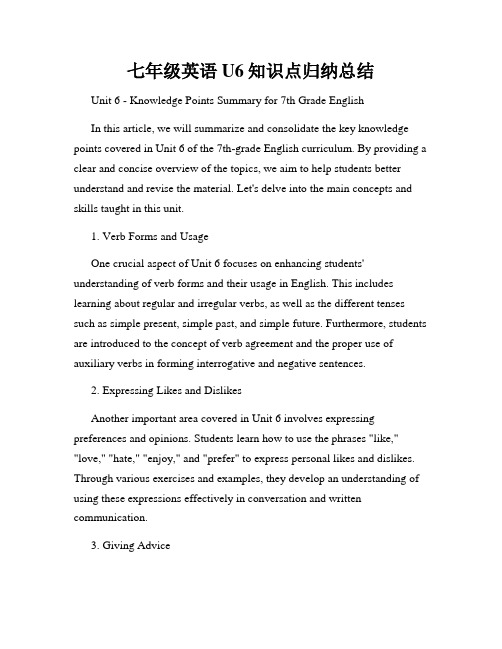
七年级英语U6知识点归纳总结Unit 6 - Knowledge Points Summary for 7th Grade EnglishIn this article, we will summarize and consolidate the key knowledge points covered in Unit 6 of the 7th-grade English curriculum. By providing a clear and concise overview of the topics, we aim to help students better understand and revise the material. Let's delve into the main concepts and skills taught in this unit.1. Verb Forms and UsageOne crucial aspect of Unit 6 focuses on enhancing students' understanding of verb forms and their usage in English. This includes learning about regular and irregular verbs, as well as the different tenses such as simple present, simple past, and simple future. Furthermore, students are introduced to the concept of verb agreement and the proper use of auxiliary verbs in forming interrogative and negative sentences.2. Expressing Likes and DislikesAnother important area covered in Unit 6 involves expressing preferences and opinions. Students learn how to use the phrases "like," "love," "hate," "enjoy," and "prefer" to express personal likes and dislikes. Through various exercises and examples, they develop an understanding of using these expressions effectively in conversation and written communication.3. Giving AdviceUnit 6 also equips students with the skills necessary to give advice using appropriate language and structures. They learn how to construct sentences using "should" and "shouldn't" to provide suggestions and recommendations. Additionally, students acquire knowledge of modal verbs such as "could" and "might" to express possibility and uncertainty when offering advice.4. Future Plans and IntentionsUnit 6 covers vocabulary and expressions related to discussing future plans and intentions. Students learn to use phrases like "going to" and "want to" to express planned actions and aspirations. They also practice using time expressions and adverbs to indicate when these future events will take place.5. Asking for and Giving DirectionsIn this unit, students develop their ability to ask for and provide directions in English. They learn key vocabulary related to locations and directions, such as "turn left," "go straight," "intersection," and "opposite." Utilizing this vocabulary, students engage in role-plays and dialogues to enhance their communication skills and ensure they can navigate and assist others in unfamiliar places.6. Writing EmailsFinally, Unit 6 introduces students to the basics of writing formal emails. They learn the appropriate structure and language to use when composing emails for various purposes, such as making inquiries, seeking advice, or expressing opinions. Additionally, students become familiar with email etiquette, including the use of formal greetings and closing remarks.Overall, Unit 6 of the 7th-grade English curriculum provides students with a comprehensive range of language skills and knowledge. By mastering verb forms and usage, expressing likes and dislikes, giving advice, discussing future plans, asking for and giving directions, and writing emails, students are equipped with fundamental tools to improve their English proficiency. It is essential for students to regularly review and practice these key knowledge points to ensure continued progress in their language learning journey.In conclusion, this summary has outlined the main knowledge points covered in Unit 6 of the 7th-grade English curriculum. The comprehensive understanding of these topics will undoubtedly contribute to students' overall language proficiency and enable them to communicate effectively in English.。
新目标英语七年级下第六单元辅导材料

新目标英语七年级下第六单元辅导材料一短语1 照像2 take photos/ pictures of sb/ sth给某人或某物照相3 玩得愉快4 为某人工作Eg: Y uan Y uan works for CCTV’s Around The World show5 在度假中=on holiday, Eg: There are many people here on vacation.On holidays在节假日6 一些…另外一些…一个…另一个…(两者之间)Eg: There are many students in the classroom. Some are writing, others are reading.7 穿上(表动作)wear (动词)穿着(表状态)in (介词)穿着(表状态)dress (动词)给某人穿衣服8 在沙滩上9 这一群人10 在这样热的天气里11. 对……感到惊讶to one’s surprise 使某人惊讶的是Be surprised that +从句sth surprise sb.某事使某人惊讶12. be relaxed / surprised /interested修饰人Be relaxing /surprising / interesting 修饰物13 在雨中二.重点句型1.How is the weather? 天气怎么样?It’s raining. 在下雨。
2.What are you doing? 你正在做什么?I'm watching TV. 我在看电视。
3.What are they doing? 他们在做什么?They are studying. 他们在学习。
4.What is he/she doing? 他在做什么?He/she is playing basketball . 他/她在打篮球。
三.重难点解析1 询问天气情况的句式:(横线内容可替换)①How is the weather in Beijing? (How is the weather today?)②What’s the weather like in Beijing? ( What’s the weather like today?)2 回答上面问题的句式:①It’s + adj. (形容词)Eg: It’s windy.有风②It’s +doing.如:It’s raining heavily/hard.正在下雨。
(人教版+朗文)初一英语同步辅导(含同步练习)Unit6Isthisyourpencil-box?
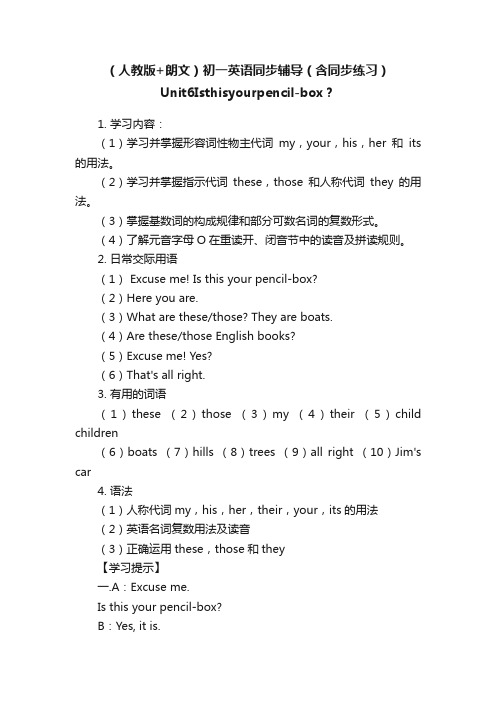
(人教版+朗文)初一英语同步辅导(含同步练习)Unit6Isthisyourpencil-box?1. 学习内容:(1)学习并掌握形容词性物主代词my,your,his,her和its 的用法。
(2)学习并掌握指示代词these,those和人称代词they的用法。
(3)掌握基数词的构成规律和部分可数名词的复数形式。
(4)了解元音字母O在重读开、闭音节中的读音及拼读规则。
2. 日常交际用语(1) Excuse me! Is this your pencil-box?(2)Here you are.(3)What are these/those? They are boats.(4)Are these/those English books?(5)Excuse me! Yes?(6)That's all right.3. 有用的词语(1)these (2)those (3)my (4)their (5)child children(6)boats (7)hills (8)trees (9)all right (10)Jim's car4. 语法(1)人称代词my,his,her,their,your,its的用法(2)英语名词复数用法及读音(3)正确运用these,those和they【学习提示】一.A:Excuse me.Is this your pencil-box?B:Yes, it is.A:Here you are.B:Thank you.【例题】选择填空:-“________. Is this your cup?”-“Yes, it is.”A:Excuse me B. Sorry C. Thank you精析:本句问“这是你的茶杯吗?” “是的,它是。
”所给选项里,A是打扰别人时的礼貌用语,B是对不起,C是谢谢。
B、C不符合题意,只有A是正确的。
2. Thank you 意思是“谢谢”,表达同一个意思的词还有很多,如That's OK,That's all right,You're welcome, Not at all,Glad to help等。
新人教七年级英语上册单元复习资料、周末辅导(Unit6)

新人教七年级英语上册单元复习、周末辅导(Unit 6)可数名词与不可数名词名词按其所表示的事物的性质可分为可数名词和不可数名词。
可数名词有单数和复数两种形式,单数名词变复数名词时,有一定的规律可循(见下表),但也有一些不规则变化,需要逐一记忆。
不可数名类别构成方法例词一般情况加-s cup→cups,friend→friends,banana→bananas以s,x,ch,sh等结尾的词加-es class→classes,box→boxes,watch→watch es,wish→wishes以辅音字母加y结尾的词变y为i,再加-es dictionary→dictionaries; family→families以f或fe结尾的词把f/fe变为v,再加-es leaf→leaves,knife→knives 加-s roof→roofs以o结尾的词有生命的,加-es tomato→tomatoes; potato→potatoes无生命的,加-s radio→radios; photo→photos; zoo→zoos【用法点拨】1.单数可数名词前常用冠词a/an或my,your,his等物主代词或指示代词this,that来修饰。
2.若表示一类事物可用the加单数可数名词表示,也可用复数名词表示。
3.不可数名词一般没有复数形式,不能用不定冠词a/an或指示代词this,that,these,those或数词one,two,three等修饰,但可用定冠词the,some或lots of/a lot of(许多)来修饰。
4.不可数名词的数量要借助“基数词+表示量的名词+of”短语表达,如three pieces of bread(三块面包),two glasses of milk(两杯牛奶)等。
5.不可数名词作主语时,谓语动词要用单数形式。
6.用代词指代不可数名词时,用单数it,不用复数they或them。
Unit 6-七年级英语复习资料

初一下册英语语法Unit 6 It’s raining!一.听力Conversation 1Tom: Hey, Peter. Happy New Year!Peter: Happy New Year, Tom!Tom: How’s the weather down there in Shanghai?Peter: It’s cloudy. How’s the weather in Boston?Tom: It’s windy.Conversation 2Peter: Hi, Aunt Sally. Happy New Year!Sally: Hello, Peter. Happy New Year!Peter: How’s the weather in Moscow?Sally: Oh, it’s snowing right now.Conversation 3Peter: So, how’s the weather there in Beijing?Girl: It’s sunny.Conversation 4Peter: Happy New Year, uncle Bill!Bill: Happy New Year!Peter: How’s the weather in Toronto?Bill: It’s raining, as usual!Activity 2a:Listen and number the pictures (1-4) as you hear them. Scott: Hello, Lucy. This is Scott. Happy New Year!Lucy: Happy New Year, Scott!Scott: Is Uncle Joe there ?Lucy: No, he isn’t. He is outside.Scott: Oh? What’s he doing?Lucy: He is playing basketball.Scott: Is Aunt Sarah there?Lucy: Yes, she is, but she is busy right now.Scott: What is she doing?Lucy: She is cooking.Scott: How about Mary? What is she doing?Lucy: Nothing much. She is only watching TV. I can get her.Scott: Thanks. And can I say "Hi" to Jeff, too?Lucy: Sure. He is playing computer games.Activity 2a:Listen. Look at the chart. Write what Maria and Sam answer to “How’s it going?”Maria: Hello, Sam?Sam: Maria? Hi! Where are you?Maria: I’m in Mexico. I’m calling to say happy birthday!Sam: Oh, thanks!Maria: So, how’s it going there?Sam: Great! How’s it going with you ?Maria: Pretty good. What are you doing?Sam: I’m having a party. My whole family is here.Maria: Oh, that sounds like fun. How’s the weather ?Sam : Terrible. It’s cold and raining. How’s the weather there?Maria: Hot. Hot and humid. And sunny.Sam : Sounds good...Maria: Uh-huh.Sam : So, what are you doing in Mexico?Maria: I’m visiting my grandmother.Activity 3a:Yuan Yuan is reporting for CCTV’s Around The World show. Underline the things that people are doing. Circle the words that describe the weather.Thank you for joining CCTV’s Around The World show(世界巡回演出). Today, we’re in Australia. It’s a beautiful, sunny day! There are many people here on vacation. Some are taking photos. Others are lying on the beach. Look at this group of people playing beach volleyball. They look cool! I am surprised they can play in this heat. This is a very interesting place. The people are really relaxed!Activity 3b:Look at the pictures of France. Then fill in the blanks.It’s winter in France. The weather is windy and cold. People are wearing coats and scarves. But everyone is having a good time. Friends are talking in restaurants. In a park, a musician is playing the guitar and some boys are playing soccer. One man is taking a photo.二.要点分析1.talk交谈say /tell /speak /talk 的区别:① say:说/讲着重说的内容,它的宾语只能是“话” 不是人.② tell:告诉某人某事.a. tell sb sth.b. tell sb. about sb. /sth.③ speak:表示讲何种语言/打电话中speak to sb.④ talk: 交谈、聊天(不及物动词:后面不能直接跟宾语)a. talk to /with sb. b. talk about sth.谈论…⑤练习:Can I "Hi" to Jeff, too?I have something important to you .She can three languages now .He is with his pen pal now .I want to her. 我想和她说话。
Unit6-2021-2022学年七年级英语人教版上册单元复习

七年级上册英语教材复习资料Unit6一、词组:1. 考虑做某事think about doing sth2. 询问某人关于某事ask sb about sth .3. 想要某物want sth4. 想做某事want to do sth;5. “想要成为…;想要变得…” want to be…6. eat well 吃得好7. 某人的生日晚宴sb’s birthday dinner8. next week 下周9. 一些水果/ 食物some fruit / food10.一些水果/ 食物eating habits11. 就早/ 午/ 晚餐而言for breakfast / lunch / dinner12. 最后一个问题one last question13. 吃草莓和苹果eat strawberries and apples14..一个苹果和一个鸡蛋an apple and an egg15. 一些胡萝卜和鸡肉some carrots and chicken16. 一些沙拉some salad17. 一些西红柿some tomatoes18. 水果和蔬菜fruit and vegetables19. 喜欢冰淇淋like ice cream20. 喜欢吃香蕉like eating bananas21. John的生日宴会John’s birthday party22. 蔬菜沙拉vegetable salad 水果沙拉fruit salad23. 这位排球明星the volleyball star24. 早餐吃汉堡和水果eat hamburgers and fruit25. 吃一些健康食品eat some healthy food26. 想变胖want to be fat27. 吃早/ 中/ 晚餐have breakfast / lunch / dinner28. 踢足球踢得好play soccer well29. 什么水果/ 食品what fruit / food二、重点句子:1. 你喜欢沙拉吗?是,我喜欢。
- 1、下载文档前请自行甄别文档内容的完整性,平台不提供额外的编辑、内容补充、找答案等附加服务。
- 2、"仅部分预览"的文档,不可在线预览部分如存在完整性等问题,可反馈申请退款(可完整预览的文档不适用该条件!)。
- 3、如文档侵犯您的权益,请联系客服反馈,我们会尽快为您处理(人工客服工作时间:9:00-18:30)。
4月8日练习题一、单项选择1. Bob can play _____ basketball but can’t play ______ violin.A. the; theB. the; ×C. ×; theD. a; the2. ______ Saturday morning, I usually get up ______ 10:00.A. In; onB. On; inC. In; atD. On; at3. --What _____ does Alice like?--She likes koalas because they’re _____cute.A. clothes; a lotB. subjects; a lot ofC. animals; kind ofD. sports; lots of4.. --_____ does you father go to _____?--By car. His company(公司) is far from home, but he likes this _____.A. Where; job; workB. How; work; jobC. Where; work; workD. How; job; job5. Hamburgers are my favorite food. They ______ very good.A. soundB. tasteC. lookD. show6. --Is it 8:40 now? --Yes, it’s _______.A. twenty to eightB. twenty to nineC. twenty past eightD. twenty past nine7. --Where is your brother? --He _____ a movie in his room.A. looksB. watchesC. is watchingD. looking8. Kate doesn’t like yellow, so she _________ yellow clothes.A. always wearsB. never buysC. usually is wearingD. sometimes buy9. ______ I go to bed, I always ______ first.A. After; take a walkB. So; get dressedC. Before; take a showerD. When; get up10. Jim, can you _____ me a story ____ English?A. speak; speakB. talk; withC. say; useD. tell; in11. As a student, you mustn’t _____ class.A. be strict inB. help withC. be late forD. talk with12. --What do you ______ the computer game? -- It’s funny.A. talk toB. look atC. play withD. think of13. --_____ do you _____ the bus stop? --At 7:45 in the morning.A. When; getB. What time; get toC. When; arrive inD. What time; arrive14. --______do you need to get home from here? -- Only 10 minutes.A. How longB. How farC. How muchD. How old15. --I don’t have _______ rules at home, what about you? --I don’t, ______.A. much too; tooB. too much; eitherC. many too; tooD. too many; either二、完形填空Hi! My name is Li Lei. I like drawing a lot and I’m in the school 1 club. I like sports, too. Every morning, I 2_ at half past six. After taking a shower, I run 3 about half an hour. At about a quarter past___4 , I have a quick breakfast. I usually go to school by 5_ at half past seven. It takes me about fifteen ____6 to ride to school. I’m always on time and I’m __ 7 late for school. Before classes, I usually play ping-pong 8 chess with my classmates. The first class begins(开始) at eight o’ clock. After school, I __ 9 first, and after doing my homework, I like drawing pictures. It’s four o’clock in the afternoon now. I’m drawing a picture of my pet10 . It’s a smart dog. Ha! I really feel very happy.1. A . art B. science C. English D. chess2. A. take walks B. go out C. eat out D. get up3. A. in B. at C. for D. with4. A. six B. seven C. eight D. nine5. A. bike B. bus C. car D. subway6. A. minutes B. hours C. days D. weeks7. A. always B. never C. sometimes D. usually8. A. but B. because C. or D. so9. A. wash the dish B. wash my clothes C. do homework D. do sports10. A. lion B. panda C. cat D. dog三、阅读理解AA. 368-5788B. 345-1238C. 449-3327D. 378-57882. Mr. Cai is ________.A. a ping-pong teacherB. a piano teacherC. an art teacherD. a bus driver3. People can go to the art club on ______.A. Monday morningB. Sunday eveningC. Friday morningD. Wednesday evening4. Who may call Tomas?A. Ms. Green. She is thinking about a trip.B. Mr. Smith. He drinks a lot.C. Peter. He wants to learn to drive.D. Miranda. She is late for work.5. The underlined(划线的) word ―safe‖ means(意思是)_____ in Chinese.A. 清醒的B. 勇敢的C. 安全的D. 轻松的BDo you know London Zoo? It is very famous. Many people know it. It is in London. The zoo was first opened(开放) to people in 1847. Sometimes the zoo is also called Rege nt’s Zoo.Now there are over 16,000 cute animals in the zoo. You can see many animals—pandas, lions, tigers, bears, giraffes, koalas and many more. You can also meet some African animals—elephants and hunting dogs. It’s really great fun to see them.It also has many beautiful trees there. The zoo is usually open from 10:00 a.m. to 4:00 p.m.Do you like animals? Do you want to go to the zoo? When you’re in London, you can go to the zoo by bus or by subway.6. The underlined(划线的) word ―famous‖ means(意思是)_____ in Chinese.A. 危险的B. 现代的C. 著名的D. 拥挤的7. Usually, London Zoo is open for _____ hours every day.A. 5B. 6C. 7D. 88. What does the second paragraph(段) tell us?A. How to go to the zoo.B. What animals are in the zoo.C. Where the zoo is.D. When to go to the zoo.9. We can know that _______.A. tigers in the zoo come from AfricaB. lots of people know the zooC. people can’t go to the zoo on MondayD. people can go to the zoo before 9:00 a.m.10. The best title(标题) of the passage is ______.A. African AnimalsB. London TripC. Beautiful TreesD. London Zoo四. 用所给词的适当形式填空。
